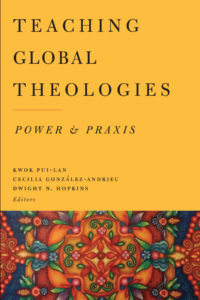Global theologies offer an important corrective to Western cultural biases common to Christian theological discourse. Doing theology responsibly today requires engagement with theological voices from among the world’s diverse communities, especially those of non-Western heritage. Teaching Global Theologies recognizes that despite an increasing awareness of globally-informed theological outlooks, a clear “privileg[ing of] the European and Euro-American traditions” permeates the present-day teaching of theology (1). This edited volume contends that theological education must be pedagogically transformed to accomplish one of its urgent tasks: to shape faith leaders well-informed of their increasingly “global[ized] and transnational” surroundings, allowing them to lead their religious communities conscientiously (1). This book is the product of multiple “collaborative” meetings among an assorted group of scholars of varying backgrounds, primarily from the United States, but also Asia and Europe (viii, 2). The collection provides a much-needed resource for budding and established “scholar-educator[s] in the areas of theology, ethics, and world Christianity,” by introducing models for teaching theologies which seek to form “global citizens” (7). As such, this volume testifies to the thirst among theologians for critical dialogue concerning best practices in globally-mindful theological pedagogy.
The book’s tripartite structure categorizes its essays by issues key to pedagogies that aim to form leaders “hospitable” towards human diversity and “attentive” to the plight of those “suffering” in today’s world (Martell-Otero, 144-145). In Part One, the contributors outline approaches to the field of global theology and its significance for theological education (Kwok), noting the importance of Christian theology’s contextual nature throughout its history (Dyrness). This section places theology’s contextual legacy in conversation with Christian historiography, as well as comparative theology (Kärkkäinen), underscoring the value of learning from difference. Parts Two and Three demonstrate that dialogue with historically neglected perspectives in theology necessitates pedagogical attention to realities of power, access (González-Andrieu), and identity (De La Torre, Fernandez), among both educators and students. These latter parts of the collection highlight pedagogical theories which emphasize education’s potential to facilitate “consciousness-raising” regarding “global ethical challenges” (Hinga, 126). In this section, several contributors suggest communal learning as a necessary component of global pedagogy. Communal practices include “global comparative conversation” (Hopkins, 110), or interrogative refinement of one’s theology through encounters with difference, and “dialog[ical] and collaborative” pedagogy, where “community formation” occurs as students together engage difference (Martell-Otero, 145). Also discussed is how “cultural and theological resources in Chinese” can facilitate students’ recognition of the important contributions of Chinese Christian theology in global Christian theological conversation (Lai, 92).
This volume’s greatest contribution to theological pedagogy lies in its ability to draw together an abundance of critical issues relevant for teaching global theology, providing sufficient analysis to spur constructive exchanges among educators within this field. In particular, echoes of liberation theologies undergird the book in its association of global theology with the work of justice. While many contributors express this principle through varying foci, they all remind educators of their responsibility to utilize pedagogy for the service of those marginalized in Christian theological education and wider societies. In this way, the collection challenges educators to cease perpetuating in the classroom the unjust power differentials— e.g. of “race, ethnicity, class, gender, and sexuality” (2) — which reproduce oppression and disproportionate suffering in the world. Several authors also note the ethical fruit which could potentially blossom from students’ classroom engagement with difference, as explored especially through varying cultural expressions of theology, and other religions. Thus, a key strength of this book is its capacity to spotlight the ethical urgency of teaching global theology.
Of significant import within this volume is a central issue identified by Lai Pan-chiu as “how to overcome the psychological or theological barriers” which perpetuate Western bias and impede students’ full participation in global theological dialogue (91, 104). This challenge merits further reflection on pedagogical practice related to students whose encounters with Western bias in theological education may inhibit their theological voice as related to “…their own family of origin insights” (Hopkins, 110). This volume offers some promising considerations in this respect, including Lai’s use of “local resources” to assist students in “…rethink[ing] and retriev[ing] their own theological heritage in a global context” (104, 92), yet this discussion remains ripe for future dialogue. In sum, the wide range of germane questions probed in this book provide theological scholars and educators with much fuel to ignite further conversation regarding global theology’s relevance in a globalizing world.
Emory University




